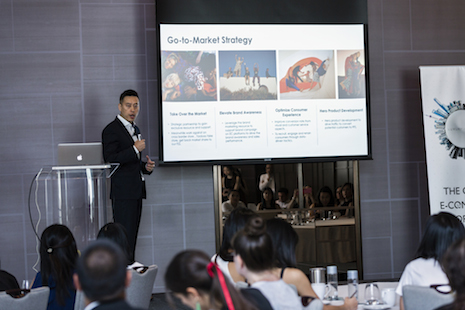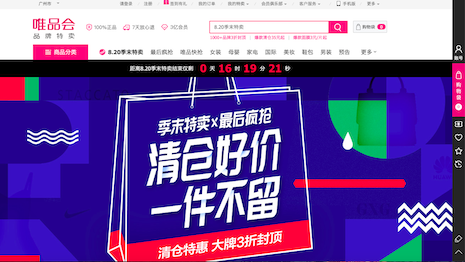NEW YORK – Building an ecommerce ecosystem and infrastructure in China is not easy. Blame the exacting Chinese consumer.
The world’s fastest-growing luxury market is spoilt by speedy gratification, frictionless payments, easy search and same- to next-day delivery offered by platforms such as Secoo, Tmall, Taobao, JD.com, VIP and WeChat. Not surprisingly, consumer expectations are higher – and it reflects in little things that brands have to do to pamper their base.
“On Amazon you have one to two photo shots per product, while in China you need five to six” with an added video per SKU, said Kai Liu, chief strategy officer of Buy Quickly.
Consumers expect to examine the merchandise online with more granularity in a mobile-device-driven society.
Buy Quickly, a one-stop ecommerce services provider for China, yesterday cohosted with ad agency Digital Luxury Group (DLG) and its Luxury Society subsidiary a breakfast event titled “The China Ecommerce Opportunity.” The event was hosted at the Four Seasons Hotel Downtown in Manhattan, attracting 60-plus luxury executives focused on China.
Many happy returns?
Even China-originating returns can be a complicated issue.
Products bought from cross-border Web sites may require returns to a non-mainland China location, thus frustrating local Chinese customers.
Verifying the authenticity of returned goods is another wrinkle.
Not surprisingly, returns management is key in a growing ecommerce market such as China.
“The return rate of products priced over $300 is over 50 percent,” Mr. Liu said.
This return rate was particularly applicable to apparel.
The Chinese ecommerce market is being pulled in two different directions, one leaning toward social and content and the other more directly ecommerce.
Additionally, the migration from mass to premium brands makes ecommerce more hybrid and diverse.
“Trends are that ecommerce-driven platforms are trying to bring more content onto the platforms – for example, Taobao – and social content platforms are developing more ecommerce functionality,” Mr. Liu said.
 Kai Liu, chief strategy officer of the Aug. 21 China ecommerce opportunity co-sponsor Buy Quickly, said the Chinese customer was used to sophisticated levels of service. Image credit: DLG and Luxury Society
Kai Liu, chief strategy officer of the Aug. 21 China ecommerce opportunity co-sponsor Buy Quickly, said the Chinese customer was used to sophisticated levels of service. Image credit: DLG and Luxury Society
Traffic stop
Each ecommerce platform has a different shtick.
For example, Red is a lifestyle community and seeding powerhouse.
The WeChat Mini-program is more intimate for premium service and product.
Tmall, Secoo and VIP are ideal for online flagship stores.
And the marketer’s official Web site is the key purveyor of brand’s image.
Even within these platforms, growth has plateaued or tapered off. Tmall’s GMU growth rate is dropping, Mr. Liu said.
The market has matured to the point where brands need better traffic to their sites and online locations.
“Once you have quality, how to grow your core customer?” Mr. Liu said.
MR. LIU HAD had a four-prong recipe for a go-to-market strategy for Chinese luxury ecommerce: Take over the market, elevate brand awareness, optimize consumer experience and develop hero product.
More marketing investment and growing fans and members were also advised in an Chinese market where loyalty ties are weakening to brands in favor of products and price-led decisions.
“To build brand loyalty, have direct traffic,” Mr. Liu said.
{"ct":"sUWkgYVB2AaTxfktj2tz12yeXtqH8TeDO3h+eKBPr1yunot9lpiNa0W7F96DpVyyGD9fxHDqA3Ro5BhYiLdmmgYahSq\/YHVWVqvcS5SrGvo7Ow3B62b2A\/SWQa8bJam9AbwfCyk5R6RlSK6JADdIaqoLPCat\/eq2w8R12c6Ts4sFKqOnTbxQjY0i3ajwMoGYSEjUGHUo+nq00+xjPWO61YlMd1s3XmkLFjUfIPeKxlf4B4dUbYkvsqK0zTGqdMMKGoGXvwn0oZLVmzTIv7cNNG7qOKNIP5T5cxDyurBgd1nlzGg1YG\/2WJmgsKqD4ZhpoGo0fE5+Z1Ut9HuRx2GeYUwKPfFu4P2EybnEFDcMdalSItP6g1oD\/7ODus5n\/2HPY6FxAfVFv2kmiT+NtP9E0oi2a+r+9xn1T8Z0xDOh8ucHzhmGXR4bYqOqk\/A2Bm1gE2WVbX8bfo04vGb1iywQbTzfeY31P\/oKnrHWNmKkaEZ0YSsNTqXoLXrtBU9LMgn9KIzeQFNX9p6BcIbQ\/ZOD768+dR9KKb2mRu8NA8Eq89s8+B3nADfOwl6uCcX4kubTYL6cfYH6MFvpynnqTKbov8pLbnu2iOGg1Mq\/qkSJyo4RuCUX6EAi8mShOydOt2wQfEEYV5V55fsgKzNLQPHnm2cGWsw1qprIoObEqMkcYOps6ww1S+Na9emDvZSc7LqK5GQ9sk2EqgRL6NNoD8vTsfotH4GmyY3z72fDtd6fxgm0k5T25735NOVNUGAvWEW\/RZpdZHOP+fVROCGWfPcb5V7N30Nb8LcBhDEuAfkrjFebPxDA0d5EK9oKmUnqPbJurW7GGUQE0KN77ZSqEyARu+8FBpv+90RiLDdg00QJWFQrRPpt0kHXzXvgt7z\/Mj97IPPi8flmH0wKNSarp82c7Ncn8i6\/OeBfRD6hQe5xeCt1m7VuPRLDJcuewgeigbHrFqxVMRLPHh8npzicr\/mluoyxSmaSKJcKmBgJBQxr8D4nbBInH+K+8upM5GdQl+SK1T4DNAQ4tMfJAHejRK8ERiUocQx6sjf9FII\/Il5+MlNQymvYX+16kvM61TCkwKnMPYJ2IsXBDqOIvfoSPXrK1yRpv1OJevj8AGmBRzsN3ZasatmIGM8kQB8+vkAL46aOj4xHKtR2b7Ty0UqmPPsgq6iaKgPTjWwqVDLm43Pw55Yr1VOdQ5R1Z7202ZVJsSj4zN8+pp8670zltmeNjZYML\/szkNm1VjYbCpofks2z6UO2aeoHy3ljfv0YT2BNJ4e5TV39z30Seue4NLT\/Tfq0+3zzLqfiQFgTb2KJJSd0cRXV0wfOr7KWU1qOgSVRPbD5IAhsdSF7UIetHelPO8sogX6yY2aKUuhotn6gMNJwFikek\/myMIKFCp6oRLcuKtzD14AuMpOsCjfYYUgC1pvyPon6lvgUdo2lBxUFCHP8y3jrqiFrDr0lA299c7nvrZdjGSZd\/MxgOOwPmqBiwN+j6wMhMdTKRdQ3NRfb0UY7KSz3Kt5aASZAlp208GAPS2Aw6iZqwPHV4lvFtesLr2ayq24ASY+i1eWIhc+ZO5u7f7cbTxcM8hZPkfAwN1d1wxh0wZwopXxjBzOKTxBEH8gCc27pVxSR\/jCL+TeKsidesDvocOby4sXRbSRUiVLGJMlNorPSsgrDBQ7bxhrX2C3TeUTmZRvSONg0pcT1lmi74K5m2hAX2vi1wdlWI7K3LCe+8EOap4M3v7ad356xeU1lWjB72VeCkkCaHSDt+B50eqKJ08c7BoPLx1IfnAadyDcs18OX8Fl9iSo1e+aEXCSaxuO9xi8eLEueck2OJGIGl4DYObxA6cPXIoICjObjm1JGGQM4dDpSRVddCbU5tZsrATkrbYNPPxOe8qLSL4qTmRK1Zlw60c62MlY90FzvU7M5qzSTjCfFDfVyJDXOIPz\/bnaDgrkb7x1Y2g5+DuG0hAbEpTwOvhApqee9WujpOznOigKkJU0CqIer56304uYHn1x4VhpYtTyAwHmK\/xIG7DgI8BusbFDJVdwF1t\/51+LSAEPEmxOF\/D\/GRTNCyM\/AyhBmVtC\/VdW4+OZtb8RxCkb931W7AuKrcdFjP2Va0RDkkoYtcMPrtLkaAMxKE93NT9ClMEsfGg5TioeoDg1sP6+dxFYZQdUmFIR3mKiXFDEJahf2M+vvntG+BGZDwqv54KcucDci8uM5+dlUv7SmCxIS6s0So7mGHRO1GSuI0XeAofY60h9CM5AEBGqwlZDPTYwi6gIDFglDjJvhJfK+D9g7IgHPPGyrq7Z+Pucyr93mOVDZ1vjUX5oYJ4X5wZaZlbSr5qkmgEQfVvzLkfbNVOb1ktEzGPQKVKK3Hl77MXP8kd95AicKbmll20f\/jyl0OyXULol6IaQKqW9TZWd89RLdsn\/U7cmcZzM02mbK\/DoGEQJds4a3Tre8CluBudM3n9P4yr0z19UiZgOMKBoNcV3xtdfjPvNcUkodQyc3H1iFKsiWt+VYBm5zcNOxI0c+CvSrvY\/Lzxy7ll5yK3RahSdFBuw1f1Y7q8Wa92E9BIsndjnrjZj69fQTSTY0KHY6CuUEmr301xiajP+2HMpJszIwrxibQ6+y5HD8CIrx47AA0DuAftltuVMYkWE7pbVoCWHqF\/ZJStB\/lZqwZ5R3EJL3E0Lylouun5rsx8IQH7YDKx53ESQ7KArAo2cRx30wi6BqgQADoZL1+aSNGgvKrsoNrz9kDH9YTKclg8cnaaGJTlS1KC+Ccy7HR6Qh3c9hBveZ15yzxG94vdtPVc7QAx6PkzTb8rn5mu9JNRyrmU0gWCdPDZmjESxhfiSwDw0Ywc3Z5GmQNAGwmD1r7VVVAs9UFI6NzbSnU\/He1KZlT02VSlnVG1xU27b3CKe2WgtneG789Erlh5TxF65Ixv5\/uo85FcdnqiYoFR6jVgAty6vGWEx7kU7hAMsUKU9VGJyqMv\/2D2WRaCM31PT5MPCmMPNc1z8MeJP1UffnP\/E31QR5Odq1qNMop+SBuPEWPycv9gyhiXYSD0o+fwgbumFirkRJ0yXXuStZsrSJaw\/iQ0BoihYwu8kW3GdV1g1nFeHUk4t+J8Dol+86pNpJvqHVKdg2vtebybwjmXgzwjoMu25mPjqSAQHTTV0MbY43d7tk0X+zlgPK5bEfmg3mLmmMjKtamLd2YLpU+DyST7f3qsBOMIE557aeO87E\/yK6oYZBxaUdBDhgZFHpfBf09D8BPccCD4RUtS90mcIf68Uw5QFgpNaMDfG+bjWoHZQKAoZGkFxC1q+xlgUjTVtYikoT2XkPYhgW+oiHGDDUbjhIHyw8mIqBPcls5VWe7YDl4T6LhN5d5CQnrndZan9SHlBBnaJqCcGhgUR3Vaz8gEFr1Amia6g67oG491j2EexY1UCQ16lLq4vOMhw4+9V1Or65GaOeQC1gn5VRChR0esERi1orEL2g3Y8TUfY7C1acTdqmEGJicaxQsY7UEg\/nF+3cttZshGJrfa2rBgvLhSYHDYDOfw3csqr5RDJjil50C2dLcaYyX5MuyyrfkgOStfU0Qx1y0rzNpOgFn9LEA4z0g9G03cmopeP0Yebo7T8qNfaUFWTv6s2vwDwNZ+024HMsmjKCbnreFMleQoGqApeoRAE6GDvIBSpe6PZvtSQGyz4zm92w24JdN\/m\/I0+ckX\/jF00mC\/hLG89gMtVOl0aepnWQ\/d0wpLiAKPVCRx7wlvrj3XbijyBdKH\/YZ6gw0I5OsnAGFSFJqx+IcbtRKo0F1uazYzVo09i77rU78PM2jv2B7XO4EOj2dN5kUN\/HugWZPcHa2IcU2c7doSUTn\/+wdj9dq+J42sG4hHI1x1CBe+fXj8lYeVEWdZETKoa\/0g2Yn46kTCvSZNwrivZdDKxlaCg8YG6i0XZSFU6MBTvOna0CIOl4LqLkkLQF1nk1AaRfLvF1DhIoRShSWF47DBf4n6Og9dauICLNLrJ4pAB9Ggbg+I83DWTrwWOQZ3ThjUDk3V\/0NSmZ5hLBQ+h2cI2UlAV+ZGquSmpYmSS8i90TIh4uwiyunk5muTKNaF56KCwOIxn1GYF7EpE+0BJIvOt8kj\/2OrEbyMYgfL5IaKU+tynIITjA2ZSn85\/vuKg5p91\/cMUIurMKuWEejHjvfm25iXoD\/AV64ubcWrFodiIlf3cZxgguh8DBsCgf44XwqxFpngTeDjpKVGUF86DtYmsDIPEtQ5RZvyrh91f6C2ELAoWODjPNx60ixESJij6nR6SZtGJnxNYpROTaH9BuYd7fR1qg6TZhUblOKZdCs43rA4sqVFeRfL2hZzQsOjjGWdVmJ6nKQ6RGFFvL0sNvhl1qiw4aUGFKUwKw4QnTEtdbcsSIgEEaDKqEB4HoeY4Jt84L2g6j4yBLDsPpu8vVhFL7oSNwsAvxa1D3NmskoUuCrbjok2l9z3ddM2\/GeBcvzzvKDZCUDAtP4KhThQHqwymPHy7h0nE2s7f\/dojKe7vrV3gjyMyCVADm4pgJjgnzIJ2qid661IYzsn+qF0MSdnoWv4PZ7oOuJvM+00y3+Gdhz4uECI2FhkSPHHd64pWENfi3RvbDpWy08UCSXkV+cEUvKBUL2GaBQRS8eAMErje1ibIXR7oFf\/tsRo\/lofdv66eHInkJ75KGb9snHBzkiaw+9DDp8KE3CcIs9YqFBzOUEdju5RCxf25zwNjt6sY+HqTqcKx0oQAxrdsmiVLGd9IkUPFOFh4CLbj8gI83RG1dt\/xmNPfRK5nyuHZF++94xJo\/5Nre8\/xcpsQOOMP5PIL7IaqF0QPcxiDGotaTGud6NVHUbFkXM3+oaYrnKchIS\/qZs3lp9ZB2zGG32I\/5KhzuaxWtU+NuNiPlR+\/0I\/BKSeLo0568yPqPg2LtLzeesnB35V7JyfRiV2Jsn4bIqaWzART6Mb82QKu8IXZ5\/9AE\/Re5BJ2dkxtld6kmsxiI9exQkypUEVyK08MJyqQ0HRSPFQLl9Rduz8oHY5rfQUFqgo4XZ8eSKIeBQFu2iOuCLBEJt794s5jqN\/s6sX+WNFqRI8eQLQ+AQVynkzdlOt3BWQTKYyIIIEcdl6BdLuXL+HS5iZeyBwmrj\/9KWUXSOKNrvm9GO+8mnkAQ03Ec2967x4XRxfAfqNv58Z3f8ZfgAXYDDmIk1GeNWc4CPQxz6EHPh9P37B\/PhmZqJ88lRMP0fEKlLY1Xg3Ynwoh9i5k77YOVFjJ7wZQ76ZSGkPFyVuyhU5TvDzUEJCj4TewAu3Djsry+O1YxJSbeYJWsRtBqZs2FgC0++KLDpXUY+fSnVmODHewq1YqcCulXo5vvrmp8RJWktzk+E3P4W\/lG\/uHf2f64hcrJCpE7C1tEp37lIpXeYR81JbIoKAfJfNGdBdY0ZvfPuGtJmvONNSxLm4va6ve+neM0+\/bgQ\/C1YTST2Ax03JZ2thbj28zRz4fZtJxrL0Lb2+5UuXpgYQTi3QvKxamI0lzUpMKBE1oTntjMJNSAjJB8isFR77RBHrKiOBnLUjhFksdlaVmX2uzUtKjJIx7dQ3AUA\/kNfOO8ivjE+wE9hpXPAl4PD9nyLAkM1+W5JSB6U3SyQ+t57issr9DWKRVwUr0VKUFqGgxSNHM2tuPg9WCVTMMEzvslzCaVn3YPepfhPLqO9S2Mc7iYK1h9rKlAajxE\/tyPCvAm77am4y7rD1KGcRU20EoGKzjxLcHuvdYMp79p9wFxc7NdhpYvIFGPAtjAoKOAirsN0XuH1RcU\/PkZ9FSC184\/RXzpcbd9ePCvdWggsBLBbqmQKK9SVeOdWo04SdGCrra+qRuqlb2ZD0NSnHbcFnhK\/4vhsTSviOwiwybn3MBrIDGlVsSBBFxxptU1U8jdppTH0aT0xF0pc87K9z1HHPThsQ7MnGFYo77gMeBNErV1zaqno7BhJpg1HOqHumHg\/KABwnL+z4hDAXT\/XevKsRUXLlDwZoJ6o0Q\/vg==","iv":"8d3897f1cbafecd927b06a7336488487","s":"5d8dc8a3cb475eec"}

 VIP pioneered flash sales in China. Image credit: VIP
VIP pioneered flash sales in China. Image credit: VIP
 Kai Liu, chief strategy officer of the Aug. 21 China ecommerce opportunity co-sponsor Buy Quickly, said the Chinese customer was used to sophisticated levels of service. Image credit: DLG and Luxury Society
Kai Liu, chief strategy officer of the Aug. 21 China ecommerce opportunity co-sponsor Buy Quickly, said the Chinese customer was used to sophisticated levels of service. Image credit: DLG and Luxury Society